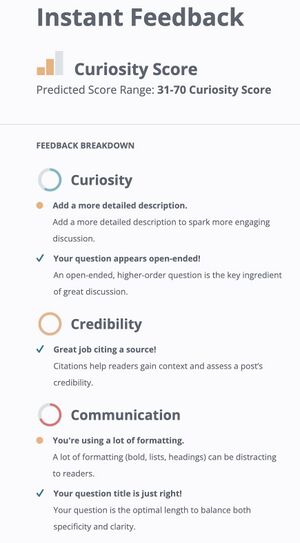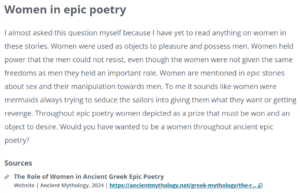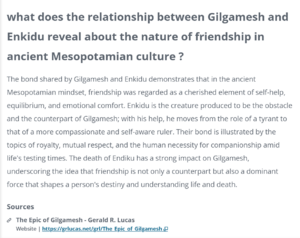More actions
m Updated. |
Spring 2025 update. |
||
| Line 1: | Line 1: | ||
{{jt|title=Week 2 Feedback on ''Gilgamesh''}}<br />{{Small|Updated: | {{SHORTDESC:Feedback for ENGL 2111 online, week 2.}} | ||
[[File:Packback-feedback.jpg|thumb| | {{jt|title=Week 2 Feedback on ''Gilgamesh''}}<br />{{Small|Updated: Jan 22, 2025}} | ||
[[File:Packback-feedback.jpg|thumb|'''Figure 1''': Packback’s real-time feedback helps you target and achieve the curiosity score you want.]] | |||
{{Dc|S}}{{start|ome strong posts on ''Gilgamesh''. Well done.}} We had quite a few post nothing this week, which scores you a zero. One of these will not hurt you too much, but you want to make sure you’re meeting your deadlines. Be sure you pay attention to the schedule and due dates. Remember Tuesdays as they are your due day this semester. While you won’t be posting every week, you need to be sure you’re keeping up with these Packback posts. | {{Dc|S}}{{start|ome strong posts on ''Gilgamesh''. Well done.}} We had quite a few post nothing this week, which scores you a zero. One of these will not hurt you too much, but you want to make sure you’re meeting your deadlines. Be sure you pay attention to the schedule and due dates. Remember Tuesdays as they are your due day this semester. While you won’t be posting every week, you need to be sure you’re keeping up with these Packback posts. | ||
If you scored lower than 70, you did not post your minimum of three times (1 question and 2 responses). If you scored a 70, you passed for doing the minimum, but your posts need more work. Pay attention to the “curiosity score”; this is often a strong indicator of the quality of your post. More often than not, I use these numbers in my evaluation. This feature is the primary reason for using Packback: aim for the grade you want in your posts. Pay attention to the real-time feedback (see the image) Packback gives as you write. If your grade is lower than you’d like, let Packback help you. | If you scored lower than 70, you did not post your minimum of three times (1 question and 2 responses). If you scored a 70, you passed for doing the minimum, but your posts need more work. Pay attention to the “curiosity score”; this is often a strong indicator of the quality of your post. More often than not, I use these numbers in my evaluation. This feature is the primary reason for using Packback: aim for the grade you want in your posts. Pay attention to the real-time feedback (see the image) Packback gives as you write. If your grade is lower than you’d like, let Packback help you. | ||
Also, I continue to receive email about this assignment, so let me clarify again: no, you do not have to respond to my questions as long as you’re posting the minimum required to Packback. However, I advise you to at least ''look'' at my questions as they might give some insight as to what to expect on the test. | Also, I continue to receive email about this assignment, so let me clarify again: no, you do not have to respond to [[The_Epic_of_Gilgamesh#Key_Concepts_and_Questions|my questions]] as long as you’re posting the minimum required to Packback. However, I advise you to at least ''look'' at my questions as they might give some insight as to what to expect on the test. In fact, very few of my questions were even considered and an inordinate amount of them seemed to address the theme of mortality, mostly on a cursory level. | ||
[[File:Forum-general.png|thumb|'''Figure 2''': Too general; does not address ''Gilgamesh'' at all.]] | |||
Addressing a specific part of a text rather than writing a general post (see '''Figure 2''') about a broad theme is always a better approach because it allows for a more focused, unique, and engaging discussion. When posts narrow in on particular passages, quotes, or moments from a text, they provide concrete evidence to support interpretations, making arguments more persuasive. Such specificity also demonstrates a deeper engagement with the material and often encourages others to respond with their interpretations of the same section. This approach is not only more interesting but also avoids generic observations that can feel repetitive or uninspired. By focusing on the details, contributors elevate the conversation, making it richer and more rewarding for everyone involved. | |||
Likewise, this unit was on the ''Epic of Gilgamesh'', but some posts did not address the epic at all, like that in '''Figure 2'''. Writing on, say, the role of women is fine, but be sure you address the primary text in some way. | |||
[[File:No-citation.png|thumb|'''Figure 3''': No in-text citation.]] | |||
Most of you are still not indicating which specific part(s) of your posts your sources refer to. Please see [[August 16, 2022|my previous feedback]]. The '''Figure 3''' post cites a source at the bottom but fails to specify which part of the post is directly drawing from or reliant on that source. This lack of clarity diminishes the credibility of the post and leaves readers uncertain about the origin of specific ideas or claims. Proper citation requires integrating references seamlessly into the text. For instance, if the statement about the death of Enkidu impacting Gilgamesh is based on a specific passage from the cited source, it should explicitly say so, such as: As seen in the ''Epic of Gilgamesh'', Enkidu’s death profoundly affects Gilgamesh, highlighting the importance of their friendship (Lucas, “The Epic of Gilgamesh”). This practice not only strengthens the argument but also gives appropriate credit to the source, ensuring intellectual honesty. Without this integration, the citation at the end appears as an afterthought rather than a deliberate acknowledgment of borrowed ideas. To improve, the writer should explicitly link the source to specific claims in the post. In the future, posts that do not include an in-text citation along with the source may be flagged for plagiarism. | |||
I have some positive hits from some of your posts when checking for AI-assisted writing. If this is you, I indicated as much in my feedback. You lost | I have some positive hits from some of your posts when checking for AI-assisted writing. If this is you, I indicated as much in my feedback. You lost points this time, but if I continue to get positive hits for AI, grades will get worse and/or other disciplinary actions will be taken. {{crossreference|(See [[Policies/Plagiarism#AI Tools|Plagiarism » AI Tools]].)}} | ||
Finally, I want to encourage you to '''be creative in your posts'''. Yes, sticking with convention readings may be safer, but try something unusual or weird. Discuss aspects of the texts that no one else is—even if you’re wrong, original and creative interpretations at least get everyone else to think more critically about the texts. If you're having difficulty trying to come up with something to write, try a [[Reader-Response Criticism|reader-response]]. Here, you find something about the text that relates to your life and experience. Not only is this approach a bit more accessible, it allows you to write about your favorite subject: yourself. | Finally, I want to encourage you to '''be creative in your posts'''. Yes, sticking with convention readings may be safer, but try something unusual or weird. Discuss aspects of the texts that no one else is—even if you’re wrong, original and creative interpretations at least get everyone else to think more critically about the texts. If you're having difficulty trying to come up with something to write, try a [[Reader-Response Criticism|reader-response]]. Here, you find something about the text that relates to your life and experience. Not only is this approach a bit more accessible, it allows you to write about your favorite subject: yourself. | ||
Latest revision as of 11:25, 22 January 2025
Week 2 Feedback on Gilgamesh
Updated: Jan 22, 2025

Some strong posts on Gilgamesh. Well done. We had quite a few post nothing this week, which scores you a zero. One of these will not hurt you too much, but you want to make sure you’re meeting your deadlines. Be sure you pay attention to the schedule and due dates. Remember Tuesdays as they are your due day this semester. While you won’t be posting every week, you need to be sure you’re keeping up with these Packback posts.
If you scored lower than 70, you did not post your minimum of three times (1 question and 2 responses). If you scored a 70, you passed for doing the minimum, but your posts need more work. Pay attention to the “curiosity score”; this is often a strong indicator of the quality of your post. More often than not, I use these numbers in my evaluation. This feature is the primary reason for using Packback: aim for the grade you want in your posts. Pay attention to the real-time feedback (see the image) Packback gives as you write. If your grade is lower than you’d like, let Packback help you.
Also, I continue to receive email about this assignment, so let me clarify again: no, you do not have to respond to my questions as long as you’re posting the minimum required to Packback. However, I advise you to at least look at my questions as they might give some insight as to what to expect on the test. In fact, very few of my questions were even considered and an inordinate amount of them seemed to address the theme of mortality, mostly on a cursory level.

Addressing a specific part of a text rather than writing a general post (see Figure 2) about a broad theme is always a better approach because it allows for a more focused, unique, and engaging discussion. When posts narrow in on particular passages, quotes, or moments from a text, they provide concrete evidence to support interpretations, making arguments more persuasive. Such specificity also demonstrates a deeper engagement with the material and often encourages others to respond with their interpretations of the same section. This approach is not only more interesting but also avoids generic observations that can feel repetitive or uninspired. By focusing on the details, contributors elevate the conversation, making it richer and more rewarding for everyone involved.
Likewise, this unit was on the Epic of Gilgamesh, but some posts did not address the epic at all, like that in Figure 2. Writing on, say, the role of women is fine, but be sure you address the primary text in some way.

Most of you are still not indicating which specific part(s) of your posts your sources refer to. Please see my previous feedback. The Figure 3 post cites a source at the bottom but fails to specify which part of the post is directly drawing from or reliant on that source. This lack of clarity diminishes the credibility of the post and leaves readers uncertain about the origin of specific ideas or claims. Proper citation requires integrating references seamlessly into the text. For instance, if the statement about the death of Enkidu impacting Gilgamesh is based on a specific passage from the cited source, it should explicitly say so, such as: As seen in the Epic of Gilgamesh, Enkidu’s death profoundly affects Gilgamesh, highlighting the importance of their friendship (Lucas, “The Epic of Gilgamesh”). This practice not only strengthens the argument but also gives appropriate credit to the source, ensuring intellectual honesty. Without this integration, the citation at the end appears as an afterthought rather than a deliberate acknowledgment of borrowed ideas. To improve, the writer should explicitly link the source to specific claims in the post. In the future, posts that do not include an in-text citation along with the source may be flagged for plagiarism.
I have some positive hits from some of your posts when checking for AI-assisted writing. If this is you, I indicated as much in my feedback. You lost points this time, but if I continue to get positive hits for AI, grades will get worse and/or other disciplinary actions will be taken.
Finally, I want to encourage you to be creative in your posts. Yes, sticking with convention readings may be safer, but try something unusual or weird. Discuss aspects of the texts that no one else is—even if you’re wrong, original and creative interpretations at least get everyone else to think more critically about the texts. If you're having difficulty trying to come up with something to write, try a reader-response. Here, you find something about the text that relates to your life and experience. Not only is this approach a bit more accessible, it allows you to write about your favorite subject: yourself.
Spring 2023 Addendum
It has been brought to my attention that the true due date stated on the syllabus (Tuesdays @ 11:59) does not correspond with the dues date on Packback (Wednesdays @ 11:59). The deadline must stay on Tuesdays, so I have corrected this error on Packback, though you still may see a Wednesday due date for the next week or two. If you posted for this assignment and I did not count it because of this due date issue, please let me know and I will give you credit. Sorry for the mixup.
